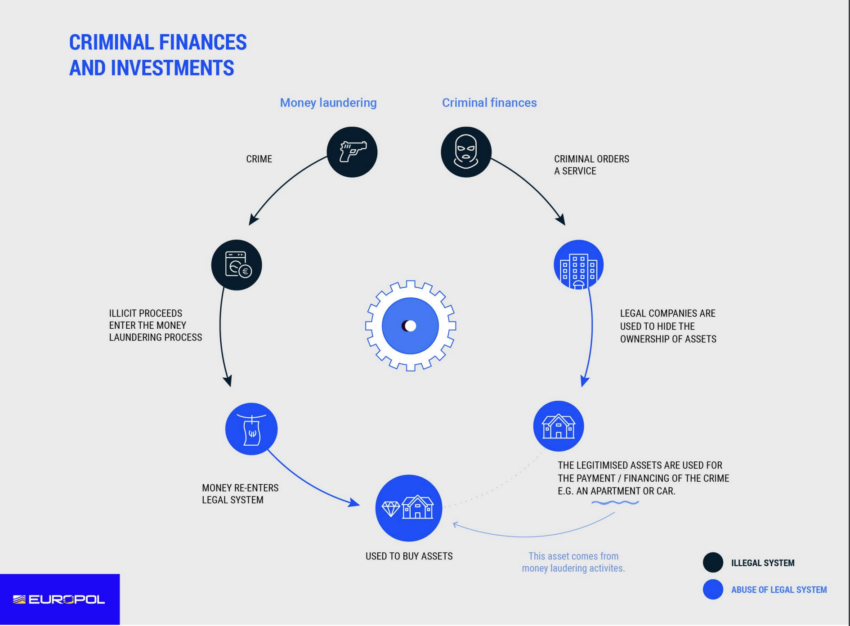
A new Europol report has revealed that criminals increasingly use technology for illicit transactions. However, they are hesitant to use crypto for money laundering.
Capital is the backbone of any organization, even criminal organizations. While emerging technology positively impacts society, criminals use it for illicit purposes, particularly to finance their activities.
Criminals Use Technology for Money Laundering
Europol, the law enforcement agency of the European Union (EU), released its first European Financial and Economic Crime Threat Assessment report, analyzing financial and economic crime.
The report focuses on the use of the new technology for money laundering purposes by criminal organizations. It mentions:
“Almost 70 % of criminal networks operating in the EU make use of basic money laundering techniques, while the rest engage with professional money laundering networks and/or make use of an underground banking system.”

Along with crypto, criminals use technologies such as machine learning, artificial intelligence (AI), and deepfake technology for financial and economic crime. The report also mentions that criminals sought the help of chatbots such as ChatGPT to conduct online fraud.
Click here to learn about the top 7 machine-learning applications in 2023.
Crypto Transactions Represent Less Than 1% of Overall Volume
Europol’s report talked in detail about the use of Web3 technologies such as cryptocurrencies, decentralized finance (DeFi), bob-fungible tokens (NFTs), and metaverse for criminal activities. It also highlighted the fact that professionals are providing crypto as-a-service for money laundering to non-tech-savvy criminal organizations.
But on a brighter note, the Executive Director of Europol, Catherine De Bolle, mentioned that criminals are reluctant to use crypto due to law enforcement’s recent successful seizures of illicit crypto. She wrote:
“Their (crypto’s) criminal use still represents less than 1% of the overall transaction volume.”
The report further elaborated:
“Advances in investigation techniques have helped detect suspicious transactions and identify actors. Many EU Member States have seen illicit funds channelled to cryptocurrency trading platforms and police have seized codes for crypto accounts… on cryptocurrency exchanges as proceeds of crime.”
As a matter of fact, in March 2023, Europol seized nearly $50 million worth of Bitcoin in a joint operation against ChipMixer. Previously, In January, Europol and Eurojust dismantled a crypto fraud network and seized over $1 million in cryptocurrencies and €50,000 in cash.
Click here to learn about the top seven Tornado Cash Alternatives in 2023.
Last month, Hong Kong Police took down a $65 million Triad-controlled operation that used crypto trades to wash the proceeds of as many as 314 crimes. Additionally, there is a 65% decline in illicit crypto flows year-to-date, compared to 2022.
Do you have anything to say about the use of crypto in money laundering or anything else? Write to us or join the discussion on our Telegram channel. You can also catch us on TikTok, Facebook, or X (Twitter).
For BeInCrypto’s latest Bitcoin (BTC) analysis, click here.
Disclaimer
In adherence to the Trust Project guidelines, BeInCrypto is committed to unbiased, transparent reporting. This news article aims to provide accurate, timely information. However, readers are advised to verify facts independently and consult with a professional before making any decisions based on this content.






